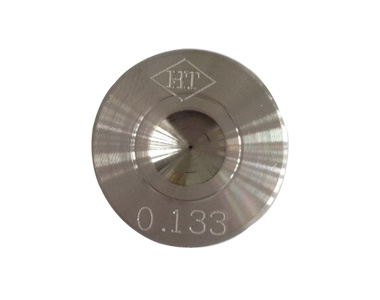


Natural diamond is the hardest substance known to the world of material, high hardness and good thermal conductivity and thermal properties, widely used inmanufacturing tools used in the industrial field, optical products and conductorindustry. Its physical properties: density 3.515g/cm3; hardness: 1.25-10.76GPa
Diamond wire drawing die of natural diamond drawing die is usually used for La type diamond diamond. This kind of diamond containing nitrogen impurity certain (0.1%orders of magnitude), and the nitrogen impurity set small aggregates synthesis. At the same time also contains small (to nitrogen impurity phase contact), these small pieces of the precise structure of unknown.
Natural diamond drawing die factory production, based on the high quality naturaldiamond materials, undergo a rigorous selection, and processing. High surface smoothness, good wear resistance is the main advantage. Applicable to the surface of the high quality requirements of various types of wire drawing. Because the naturaldiamond content has some defects can not be observed, the service life of differentnatural diamond drawing die is larger, the biggest shortcoming.
Mold size range: 0.015mm~2.00mm
Recommend doing a finished die (Chu Xianmo), microfilament die, wire surface requires extra bright mold.
It is applied to the control of platinum wire, wire, silver, copper, aluminum,molybdenum, nickel, copper, tungsten, copper alloy and other non-ferrous metal wire.
Production range:
Aperture (mm)
Tolerances (μ m
Roundness (μ m
Shell size (standard)
The outer diameter (mm) thickness (mm)
< Phi 0.050 0.5 0.25257
For 0.050~0.199 10.5258
For 0.200~0.499 0.5 0.75258
For 0.500~0.999 212510
For 1.000~1.499 422512
For 1.500~2.500 52.52512
Other shell size and aperture can be specified tolerances for customers. The company also supply
The following all kinds of wire standard hole design: (the customer can design Kong Xing)
Wire rod
Hard line
Flexible cords
Site name
Stainless steel
Copper clad steel
Tungsten, molybdenum
Copper wire
Aluminum steel
Entrance 80 ° 80 ° 80 ° 80 ° 80 °
The lubrication angle is 35 ° and 35 ° 35 ° 35 ° 35 °
Compression angle 14 °± 2 ° 14 °± 2 ° 14 °± 2 ° 14 °± 2 ° 14 °± 2 °
0.2D~0.5D 0.2D~0.6D 0.2D~0.8D 0.2D~0.5D 0.2D~0.5D parallel
Relief angle 25 °± 5 ° 25 °± 5 ° 25 °± 5 ° 25 °± 5 ° 25 °± 5 °
Exports of 60 ° 60 ° 60 ° 60 ° 60 °